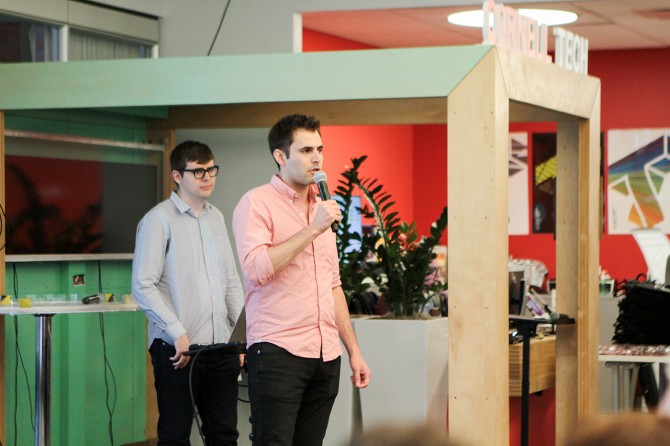Cornell Tech startup to help kids with autism raises $1.13M
By Laura Stampler
A startup founded at Cornell Tech digitizing the way teachers chart autistic children’s progress has raised $1.13 million in venture capital and will work with more than a dozen clinic chains and autism schools in the coming year.
Thread Learning, created by Greg Brill, Johnson Cornell Tech MBA ’16, and Sam Raudabaugh, Cornell Tech M.S. ’16, collects, graphs and analyzes multiple students’ behavioral tracking data simultaneously through an online portal and tablet app. It also allows educators to plan educational programs and communicate progress with parents, doctors and therapists.
The app won a Cornell Tech Startup Award of $100,000 in 2016.
“Our goal is to get the best possible care for the millions of people in the world with autism,” said Brill, who worked in autism education before pursuing his MBA. “The fact that Thread Learning is super intuitive and flexible means that educators don’t have to change how they do things, which has been a problem with other tech products, and is one reason why teachers have stuck with paper.”
Its co-founders estimate that Thread Learning saves teachers up to 45 minutes per day, per student – time that can now be devoted to working with students instead of calculating their progress by hand.
Unlike other products, Thread Learning supports all styles of Applied Behavior Analysis – a widely used type of therapy that focuses on improving specific behaviors. Thread Learning allows teachers track up to six types of behavior with multiple students simultaneously, while other platforms let teachers test only one data point with one student at a time.
Raudabaugh, who comes from a family of teachers and computer scientists, said he was inspired by the many existing apps for people with autism. “But when I talked to Greg, who had experience in the classroom, he told me that these tools had major analog problems that needed processing,” he said. “That inspired us to make user friendliness a core tenet of the company.”
The platform’s intuitive user interface was created with the help of Stephen Lang, the user experience designer-in-residence at Cornell Tech’s The Foundry.
“Cornell Tech gave us access to a great network,” Raudabaugh said.
Thread Learning will soon employ four full-time and five part-time employees. It currently works with four clinic chains and will be used at 10 campuses of NYC Autism Charter School in the coming school year.
They are also working with Proud Moments ABA, one of the largest autism therapy clinics in the East Coast, to build a product that focuses on helping doctors and therapists manage their practices.
This new venture will track clinical information to submit to insurance companies, which often ask for information supporting the effectiveness of specific treatments. Autism care is a relatively new area for insurance companies, so Thread Learning plans on making the information it receives from treatment providers easier to understand. The pilot of this new product is expected to launch in September and go on the market in spring 2019.
Brill and Raudabaugh plan to expand into other areas relevant to autism education, including machine learning and big data.
“We are looking at how we can effectively interpret our data,” Brill said. “The order that you teach things to kids with autism matters, and our collected data shows how successful different treatment paths are.”
Laura Stampler is a freelance writer for Cornell Tech.
Media Contact
Get Cornell news delivered right to your inbox.
Subscribe

